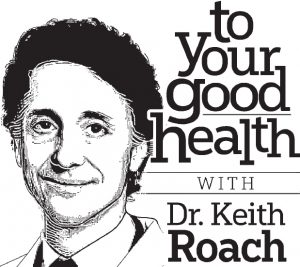TO YOUR GOOD HEALTH: No Caffeine After 50?
By Dr. Keith Roach — February 21, 2019 DEAR DR. ROACH: I recently heard that after age 50 you should not take in any caffeine. I do enjoy a cup of regular coffee with breakfast. Is this dangerous? — Anon.
DEAR DR. ROACH: I recently heard that after age 50 you should not take in any caffeine. I do enjoy a cup of regular coffee with breakfast. Is this dangerous? — Anon.
ANSWER: The majority of people over 50 continue to drink and enjoy caffeine in coffee, tea and other drinks. At reasonable doses it is very safe, and previous studies showing links to cancers have been pretty thoroughly discredited. I am all in favor of maximizing enjoyment of life in ways that aren’t harmful, and a cup of coffee in the morning is not harmful and is a big source of enjoyment to many.
As we age, many drugs (I’ll consider caffeine a “drug” for this purpose) are metabolized more slowly by the body, so some people may find that the same “dose” affects them more. This may occasionally cause a problem with sleeping for people who drink caffeine later in the day or at night, in which case the solution is to drink less or drink earlier.
Finally, age 50 seems pretty young, to me, to be concerned about changes in drug metabolism.
***
DEAR DR. ROACH: I think I may have herpes, but I’m not sure. What are the symptoms of the virus? When I go to the doctor, what do I say? When I was there last time, I was given a urine test for STDs, which was negative, but now I urinate a lot and have a bump on my penis. — M.G.
ANSWER: When we are discussing herpes as a sexually transmitted disease, we usually refer to herpes simplex virus type 2. Even though other herpes viruses can be transmitted sexually, HSV-2 is the most prevalent, with approximately 50 million people in the U.S. infected. HSV-2 usually is asymptomatic, but in both men and women it can be associated with periodic outbreaks of blisters, classically filled with clear fluid and painful. During this time, the virus can be accurately identified by a laboratory. However, it is often not a classic appearance, and it’s wise to consider the diagnosis of HSV for any genital lesion. The quality of the herpes blood test has improved in recent years, and it is a good way to make the diagnosis in someone who doesn’t have a lesion at the time they see the doctor.
Two other STDs — gonorrhea and chlamydia — can be diagnosed using a urine test, but not HSV. When you go to the doctor, ask for a blood test to rule out herpes definitively.
Urinating a lot is not a usual symptom for STDs, but painful or uncomfortable urination is.
***
DEAR DR. ROACH: We often are advised to get plenty of fruit in our diet. Is dried fruit (apricots, dates, figs, prunes) considered healthy? — N.M.G.
ANSWER: Most dried fruit is healthy; however, there are two concerns: The first is that they have about the same amount of calories and sugar as whole fruit, and easily can be overeaten. The second is that you should beware of dried fruits with added sugars. Some dried fruits are preserved with sulfites. Sulfites, as I have mentioned, cause allergic symptoms in some people, but are tolerated by most.
******
Dr. Roach regrets that he is unable to answer individual letters, but will incorporate them in the column whenever possible. Readers may email questions to ToYourGoodHealth@med.cornell.edu.
© 2019 North America Synd., Inc.
All Rights Reserved
—TO YOUR GOOD HEALTH: No Caffeine After 50?–






